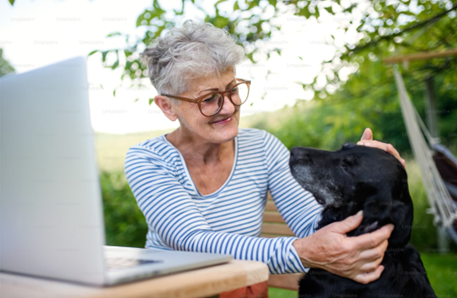Introducing: POOPS (Pets of Older Persons)
We all know that older dogs make the perfect companions for older people.
But as people get older their ability to care for their pets diminish, especially when it comes to regular exercise.
Sweet Goodbye was fortunate to meet an extraordinary women who has come to the rescue.
Cathy Gibson started the POOPS (Pets of Older Persons) chapter in Busselton in the South West of Australia in April 2019. This year they celebrate 5 years, and in that time they’ve walked over 100 dogs and had 300 volunteers.
We asked Cathy about POOPS and her connection to seniors and their pets.
What is POOPS?
POOPS stands for Pets of Older Persons. POOPS is a Western Australian incorporated not-for-profit association run entirely by volunteers, that provides a free pet-care service aiming to keep seniors together with their pets for as long as possible. Our volunteers provide a range of services including regular dog walking, transport to/from vet clinics, groomers or boarding kennels and other short-term pet-support as needed. We cater for people (mostly) over 65 years of age, disabled people, or palliative-care patients of any age who can't afford a paid support service to manage their pets at home.
How did POOPS Busselton all come about?
I started off walking the next door neighbour's dog - Boris the Labrador - as they weren't walking him. He was only one year old. And then as things progressed, I ended up walking a dog for a lady with MS, and a dog for someone who had cancer. And I thought, well, there's obviously a need for this in the community.
I was trying to convince a number of friends to help me. But as fate has it , somebody from the Busselton Greyhound Awareness Group sent me a clip from Channel 10 where an elderly lady was being interviewed because she was having her dog walked by POOPS.
So I contacted them, told them what I was already doing, asked if we could start a group here. They said that they'd already been contacted previously by regional towns, but never felt like they were well enough set up to be able to assist them. But after our meeting they decided "yep, let's give it a go". That was 5 years ago!
Tell us about the volunteers!

Today we've got 130 volunteers walking 55 dogs. We've got volunteers who are cooking, mowing lawns, mending clothes, taking them to appointments, taking them to social outings The fact that someone says, "Hi Mary, here to take Bobby for a walk. How are you? , that civil human connection without them even coming in and having a cup of coffee is enough to make a difference to these elderly people's lives. It's also a way that we can identify if we think there's maybe something going on that they need assistance with.
How have the dog walks saved lives?
We always have emergency contacts for our clients, so if a volunteer was to knock on the door and they don't answer and then we try ringing them and they don't answer, then the very next thing we do is ring the emergency contact, because they may have fallen. One client had a fall during the night and was hallucinating by the time the volunteer got there. And another gentleman who got stuck under the arms of his mobility scooter and was stuck in a hot room and couldn't get out. In both cases, these people wouldn't have been discovered if it wasn't for our volunteers as they had no family or friends.
We've actually saved their lives by going there to take the the dog for a walk.
What sort of conversations do you have with clients around the dog?
We've got a checklist that we go through where we ask everything. Things like - has you dog been vaccinated, have they been sterilised, any special requirements? We don't walk unsterilised dogs because of the risks that they pose. Our volunteers are covered by an insurance, but the dogs are not!
Over time, we have discussions around future care for the their pet as they age, as they need what to know to do if the dog gets sick or passes.
Tell me a little bit about the type of dogs that POOPS has been involved with.
We've got everything from little fluff balls to American Staffies.
Most of the dogs are aged between 7 and 15 years old. Just recently one of our clients lost her dog Anzac - the volunteers were so attached to Anzac, it absolutely broke their hearts when he passed away.
If you notice that the dog is frail and getting on, are there any conversations you have with the client around preparing for their passing?
One of the questions that we ask when I first meet them is, when was their last vet appointment? Are they up-to-date with their vaccinations? All those kinds of things. So I've got a bit of an idea about their health.
It's not something that POOPs started off providing assistance for, but if we, the volunteers, notice anything about the dog that concerns us, we tell the clients, "Look, I'm noticing Bo's limping," or "Did you notice the lumps on Jacks' back?". And if they seem reluctant to get assistance, then we just delve a bit deeper to find out, "Well, is it that you can't afford it or what's the situation?"
Some of the clients are better than others at realising that their dog's coming to the end of their life and that they need to have it be euthanised. Some just can't bring themselves. We had a gentleman whose poor dog was just getting worse and worse and worse, and he kept saying "Oh, no, I'm not having it euthanised or anything."
So we just had to really keep working on him and saying, "Well, we know you love Buddy, but this is cruel".
It’s not an easy thing for any of them. They're absolutely lost without their dogs - particularly for the elderly, because some of them don't have visitors. Most of our clients live in Department of Housing accommodation, some of them very small units, one bedroom, so very tiny, without a lot of human contact. So the dogs truly are the reason they get up in the morning. It's just what keeps them going and gives them a purpose in life. And so many will willingly give up money for the dog food and they'll go without.
When it comes to doing amazing things for elderly people and in many cases senior dogs, POOPS is ticking every box. And it's not just the pets and pet owners who take something away - “The best thing we have happening is Len, our oldest volunteer who is 86, now walks five dogs a week with his wife Pam. She comes along. She's not quite as healthy as he is. And what Len does, he loves painting, so he started off, if dogs passed away, he would paint a photo of the dog. Give him a good photo, he would... Anyway, then we all started thinking - well, that's all very sad - so he started painting them before they passed away. He has a small charge that covers his costs and the balance is a donation to POOPS.” says Cathy.
With additional funding, POOPS will be offering Vet assistance to their clients, seeing them become much more than dog walkers and an enormous asset to any community.
We shall leave the last comment to Cathy - “I'll tell you, the universe loves dogs. And they love the concept of POOPs.”




